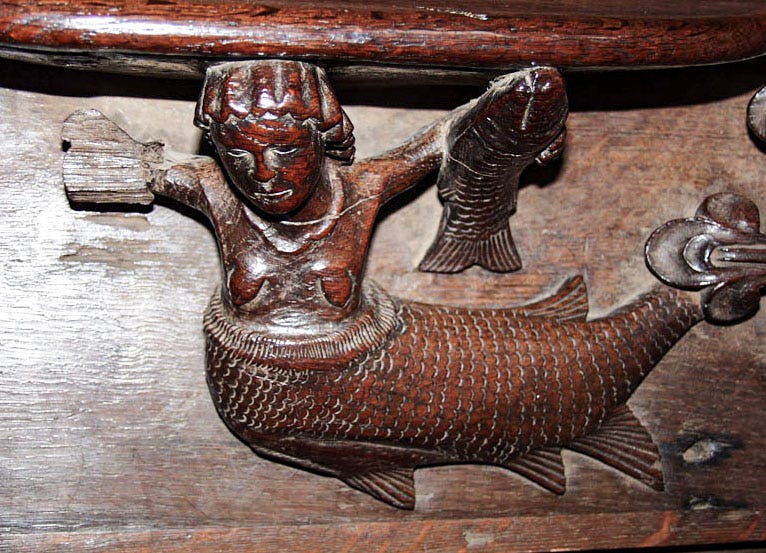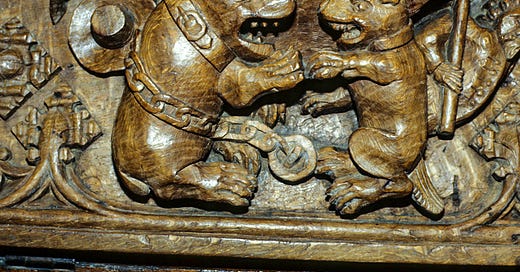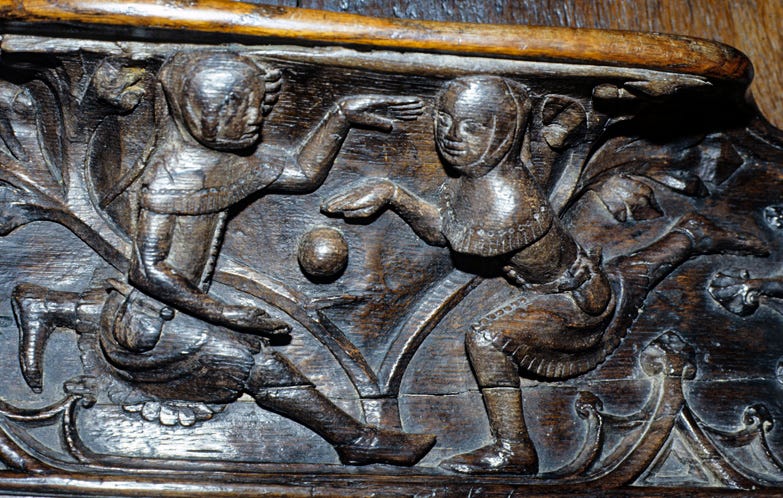The Taming of the Shrew may be the first play that Shakespeare wrote. Almost as though he wanted to assure himself that he was dedicating his professional life to something truly good, he included, before The Taming of the Shrew actually begins, a defense of his art. It occurs in the “induction,” or what we would call an introduction, which features a drunken beggar named Christopher Sly and a nobleman who finds Sly passed out near an alehouse. The nobleman decides to have some fun by moving Sly to a fancy bedroom and then pretending, when the poor rogue wakes up, that he is actually a wealthy lord who has been languishing for years in a delusional, dreamlike state. Of course the ruse includes a man dressed up as a woman and claiming to be Sly’s wife. “What must I call her?” he asks. “Madam,” the nobleman (acting the part of his attendant) replies. Sly, as usual, is confused: “‘Alice Madam,’ or ‘Joan Madam’?” The attendant clarifies: “‘Madam,’ and nothing else. So lords call ladies.”
The nobleman makes his plan even more elaborate by bringing in a troupe of traveling performers to put on a play for the lordly Sly. The play that he sees is the one that the audience was expecting to see when they came to the theater; it takes place far away from Sly’s English alehouse, and it involves the taming of a shrew (i.e., an ill-tempered woman who scolds too much).
Right before this play-within-a-play begins, a messenger arrives and helps Sly—and us—to understand its purpose. Since “too much sadness” has made Sly melancholy, and since melancholy “is the nurse of frenzy,” his physicians have recommended that he see “a pleasant comedy”:
Therefore they thought it good you hear a play
And frame your mind to mirth and merriment,
Which bars a thousand harms and lengthens life.
Born toward the middle of the last medieval century, and having grown up in the medieval ambience of rural England, Shakespeare here gives us one of literature’s most perfect monuments to the medieval spirit: it is good to play, and to be merry, and to form one’s mind in the virtue of joyfulness, because these things preserve the health of the soul.
According to the physicians of Shakespeare’s time, melancholy caused the blood to thicken, and thick blood could lead to “frenzy,” which meant not so much “wild behavior,” as it does today, but some sort of deranged or delirious mental state. I don’t know about the blood-thickening part, but overall, they were right. And if that’s what old-fashioned melancholy can do, what about endless social-media sarcasm, and relentless news-media negativity, and lifeless technological simulacra, and pseudo-religious doomscrolling, and papalotrous hand-wringing, and psychologically oppressive “morality,” and artistically barren liturgy, and fear-mongering spirituality, and all the other ways that modern humans, Christians included, banish wholesome mirth and merriment from their lives? A thousand harms, indeed! I’ve seen it with my own eyes, in different regions and social settings, with the young and the old, among the secular and the faithful: we live in an age of agitation, anxiety, confusion, delusion, disorientation, dissociation—put it all together and our society, as a collective, is afflicted by something resembling Shakespearean frenzy, on a vast, indeed a civilizational, scale.
Is the postmodern world the Age of Frenzy? Perhaps.
Was the medieval world the Age of Faith? Yes, it was.
This justifies the high providence of God, who, though he command us temperance, justice, continence, yet pours out before us, even to a profuseness, all desirable things…. Why should we then affect a rigor contrary to the manner of God and of nature?
—John Milton
Our topic last week, both on Sunday and on Tuesday, was the Dominican monk Girolamo Savonarola, a fiery—some would say fanatical—preacher who briefly turned Renaissance Florence into a city of intense and almost monastic piety. I said many things about that passionate and enigmatic reformer, but there’s one word I never used: puritan. It’s a term that weighs me down with unfavorable thoughts, and I am loath to wield it against the well-intentioned friar, but it is very hard to deny that the word is apt: Savonarola was a puritanical Catholic.
In his extraordinary spiritual zeal he turned too harshly against mirth and merriment, against edifying or legitimate or at least morally tolerable pleasures, against the worldly possessions and secular amusements and festive lifestyles that some people renounce easily, but others slowly and with great difficulty. All these things have their place in a Christian community; all are essential, generally speaking, to the emotional formation of children, to the well-balanced maturation of youth, to the psychological health of adults, to the harmonious functioning and cultural flourishing and long-term doctrinal stability of a society. The puritanical mindset, insofar as it opposes and distorts these things, is a danger to the Faith. And since puritanism is not fundamentally a historical reality but a psychological one, it is among us today, and will be with us always.
The term “puritan” originated around the middle of the sixteenth century, during the long and painful process known rather dubiously as the English Reformation. It was associated with Protestant groups that wanted to go even further in “purifying” English Christianity of liturgical ceremony, church artwork, musical instruments, splendid vestments, and other “idolatrous” or “unscriptural” practices left over from the old “Romish” religion of the Dark Ages. It is unclear whether the label “puritan” was adopted voluntarily by these factions or applied to them by their opponents. The latter seems more likely. The word appears in Ben Jonson’s 1614 play Bartholomew Fair, a comedy which found great sport in ridiculing the puritanical believers of the time:
Your Majesty is welcome to a Fair;
Such place, such men, such language, and such ware
You must expect: with these, the zealous noise
Of your land’s faction, scandalized at toys,
As babies, hobby-horses, puppet-plays,
And such-like rage.
Playwrights had strong motivations for discrediting puritans, since puritans were trying to put the playwrights out of a job. (They succeeded in 1642, when the government ordered the London theaters to close.) The following passage from the book Histrio-Mastix, written by William Prynne (d. 1669), gives you an idea of puritanical objections to theatrical entertainment:
Popular Stage-plays (the very Pomps of the Devil which we renounce in Baptism, if we believe the Fathers) are sinful, heathenish, lewd, ungodly Spectacles, and most pernicious Corruptions; condemned in all ages, as intolerable Mischiefs to Churches, to Republics, to the manners, minds, and souls of men. And that the Profession of Play-poets, of Stage-players; together with the penning, acting, and frequenting of Stage-plays, are unlawful [and] infamous.
Tell us how you really feel, William! This was published in 1633—in other words, after the entirety of Shakespeare’s career. Sure, some plays in early modern England were not particularly edifying, and some probably should have been suppressed, but it’s a bold (and maybe somewhat “frenzied”?) man who can spill such venomous ink about theaters that had housed, within living memory, the finest and most profound dramatic productions in the history of the English language.

Though “puritan” originally designated a radical-reformist wing within the official Anglican Church, it increasingly identified groups—Presbyterians, Baptists, Congregationalists—who separated from the Anglican establishment. Among these separatists were folks whose fervor for “purified” religious practice percolated into every other layer of their lives: they liked their doctrines simple, their demeanor grave, their speech direct, their attire plain, their morality strict, their punishments harsh, and their pleasures—well, they weren’t quite sure what to make of pleasure, which has an awkward tendency of showing up uninvited to practical things like refueling the body and begetting children.
This was the puritanism of the “pilgrims” who sailed across the Atlantic and populated those notoriously severe New England colonies, which became such a strange and enduring influence on the culture of the northern United States. If you’ve never heard much about American literature from the eighteenth century, or even the early nineteenth century, you can bet that the colonies’ puritan heritage has something to do with it—religion like that is not exactly fertile soil for the work of the imaginative and artistic faculties. Henry James, in his 1878 novel The Europeans, captures it memorably: Charlotte Wentworth, daughter of the grave Bostonian gentleman Mr. Wentworth, is dismayed to see the imagination of her sister Gertrude “running riot,” to the extent that Gertrude might even
come in suddenly, as from a journey, talking of the peculiar and possibly unpleasant things she had observed. Charlotte’s imagination took no journeys whatever; she kept it, as it were, in her pocket, with the other furniture of this receptacle.
The Catholics of America have been infected by the puritanical system of suppression—which is entirely un-Catholic. The system, that is, which assumes that Christian virtues are best protected if we pretend to know nothing of the dangers that threaten them.
—Sigrid Undset (d. 1949), essayist and Nobel Prize–winning novelist
It’s easy to condemn puritanism. It’s easy to point a scornful finger at Savonarola’s Bonfire of the Vanities, to deplore the Salem witch trials, to satirize the exaggerated and sometimes hypocritical habits of England’s early Presbyterians or Congregationalists. But let’s focus on two things that aren’t so easy: First, providing a truly desirable alternative to puritanical religion. Second, separating puritanism from authentic Christianity, if you’ve been surrounded by subtle forms of puritanism since birth (see the Undset quote above).
Puritanical tendencies were present in Judeo-Christian culture long before the English Reformation, and major puritanical movements, of one kind or another, have figured prominently in the dynamics of Christian history. The reason for this, in my view, is not hard to find: society, as Plato suggests, is the soul writ large, and the West’s recurrent conflicts between puritanical and non-puritanical forces mirror a fundamental and continual tension that is woven into the very fabric of human thought and consciousness: should I seek pleasure, or renounce it? indulge myself, or deny myself? satisfy the senses, or the intellect? live like an animal, or like an angel—or like a god?
There are no simple answers to these questions, and no neat-and-tidy solutions to problems involving man’s most powerful and primal desires. It’s not surprising that human societies typically lean too far in one direction or the other. The goal, as usual, is balance, and though the ideal balance is not obtainable this side of heaven, when it comes to navigating between the Scylla and Charybdis of puritanism and hedonism, medieval Christendom is the closest thing I’ve ever found to a cultural role model. We will, therefore, continue this discussion in Tuesday’s post, which will, I hope, help us to learn about this thorny topic from the Christians of the Middle Ages.











Thank you for a wonderful post! A thought I had at the end though was simply that the Church already has the perfect and simple answer to the problem of hedonism versus puritanism, and that is the sacraments. All of the sacraments are substantially connected to physically and emotionally pleasurable things (bathing, eating, annointing, sharing life-blood between spouses, etc.), while at the very same time being the supreme sources of sanctifying grace to souls. And while the Church very rightly demands discipline and reverence in the reception and administration of the same, it remains that in instituting these things, Christ definitively showed us that His friendship is to be attained essentially through the sacred use of natural pleasures and joys. It ties into the fact that the virtuous use of God's gifts is always objectively better than the total renunciation of them due to scandal. "IF your eye, or hand, etc., is a source of scandal TO YOU, then pluck it out, cut it off, etc.,"... but it is better to not be scandalized in the first place, and that is what the sacraments seek to teach and effect in us.
"Wherever the Catholic sun doth shine,
There's always laughter and good red wine;
At least, I've always found it so;
Benedicamus Domino!"